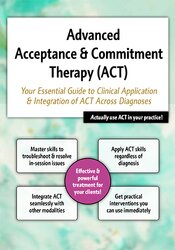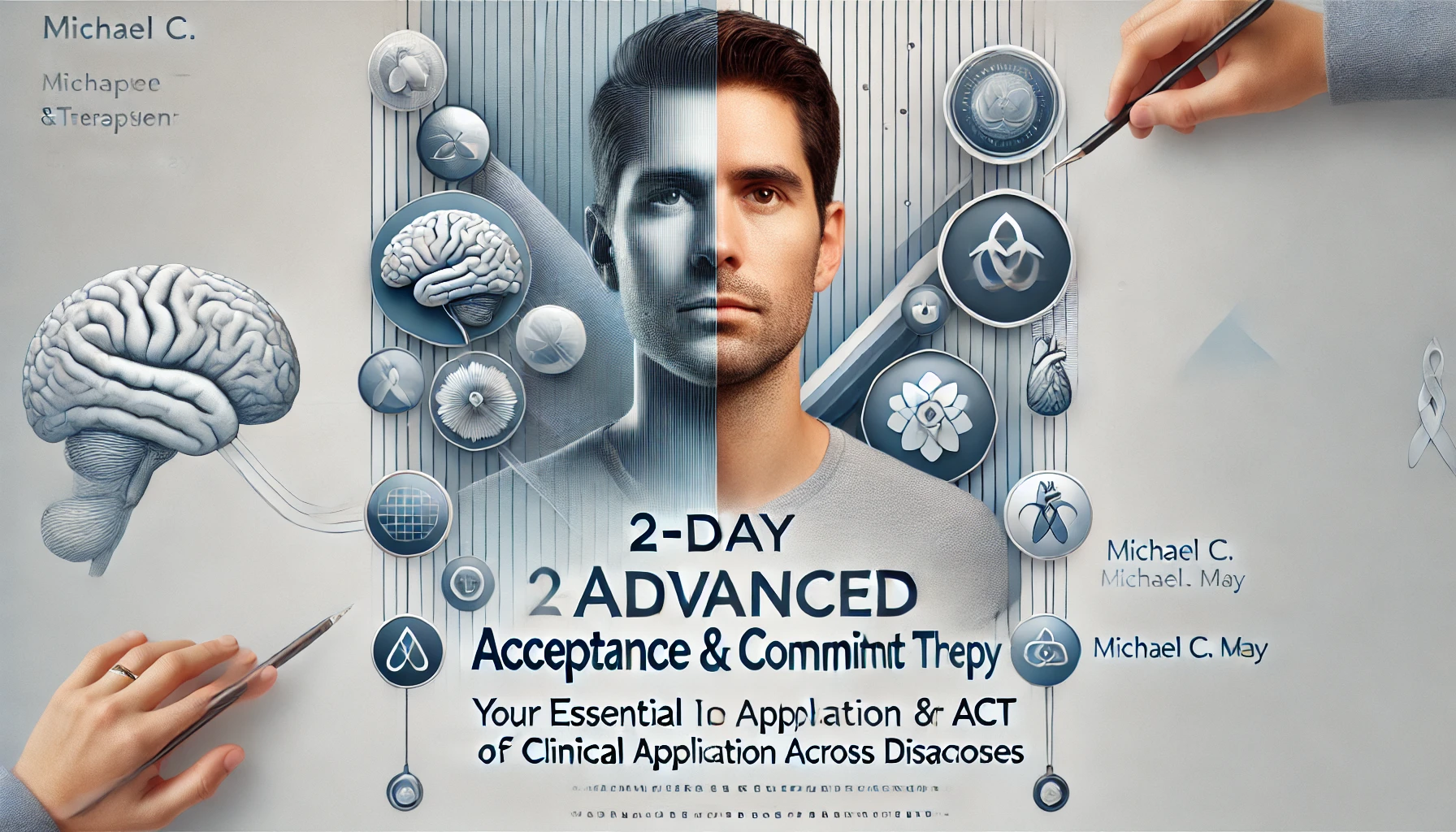2-Day Advanced Acceptance & Commitment Therapy -Your Essential Guide to Clinical Application & Integration of ACT Across Diagnoses – Michael C. May
2-Day Advanced Acceptance & Commitment Therapy -Your Essential Guide to Clinical Application & Integration of ACT Across Diagnoses – Michael C. May has the same quality as the author’s salapage.
Overview
Discover the Best Learning with 2-Day Advanced Acceptance & Commitment Therapy -Your Essential Guide to Clinical Application & Integration of ACT Across Diagnoses – Michael C. May
WisMentor is your ultimate destination for online learning. Explore "2-Day Advanced Acceptance & Commitment Therapy -Your Essential Guide to Clinical Application & Integration of ACT Across Diagnoses – Michael C. May" by top authors and instructors, designed to transform your skills and career. Start now and unlock your potential!
Salepage check: 2-Day Advanced Acceptance & Commitment Therapy -Your Essential Guide to Clinical Application & Integration of ACT Across Diagnoses
Author: Michael C. May
- Faculty:
- Michael C. May
- Duration:
- 12 Hours 56 Minutes
- Format:
- Audio and Video
- Copyright:
- May 05, 2020
Description
This program is the essential guide to actually using ACT with your clients.
Acceptance & Commitment Therapy (ACT) has long been established as effective in treating clients with a variety of clinical diagnoses.
But learning about the six core processes of ACT and applying those concepts in session are two very different things.
Buy this two-day experiential ACT training course recording, and instead of relearning the basic ACT processes, you’ll leave able to skillfully use ACT to treat your clients.
ACT expert and clinician, Michael C. May, MA, LCPC, will teach you how to overcome common issues clinicians have when using ACT, and he’ll address the most frequently asked questions he receives from other clinicians about implementing ACT in session.
You’ll hone your skills and finish this program able to:
- Use ACT to treat your clients, regardless of diagnosis
- Seamlessly integrate ACT with other modalities
- Troubleshoot & resolve in-session issues
- Create your own ACT metaphors & exercises to individualize treatment
- Boost client engagement & reduce resistance
FREE Materials For Your Clinical Toolbox!
- Psychological flexibility assessment
- Go-to defusion exercises handout
- Case conceptualization form
- ”Undermine the Control Agenda” worksheet
Handouts
| Manual – 2-Day Advanced Acceptance & Commitment Therapy (ACT) (11.6 MB) | 67 Pages | Available after Purchase |
Outline
THE ACT MODEL: A BRIEF REVIEW
- Functional Contextualism
- Hexaflex & Inflexahex
- Relational Frame Theory (RFT)
- Empirical support for ACT
- Limitations of the research & potential risks
FAQ 1: “How would I use ACT for…?”
- Convert the DSM® into psychological inflexibility
- Differentiate topography & function of behavior
- Attend to the ABCs of behavior
- Spot the toxic twins: Fusion & avoidance
- Which ACT process are you targeting in session?
- Exercises & Demonstrations
- Exercise: Functional analysis as mindfulness
- Video demo: PTSD
- Skills Training: Spot experiential avoidance
FAQ 2: “Does ACT have any metaphors or exercises for…?”
- How metaphor functions in ACT
- Experiential learning vs. psychoeducation
- Key components of ACT metaphors
- Create your own metaphors
- Exercises & Demonstrations
- Exercise: Confront the control agenda
- Exercise: Use of embodied metaphors
- Exercise: Flexible perspective-taking
- Video Demonstration: MDD
- Skills Training: Create an ACT Tool-Box
FAQ 3: “Can I use ACT with CBT?”
- Cognitive restructuring vs. defusion
- How to bring restructuring & defusion together
- Create experiential learning for your client
- Recognize rule-governed behavior
- Foster behaviors that are in line with values
- Pick go-to defusion exercises & metaphors
- Exercises & Demonstrations
- Exercise: What your words evoke for clients
- Exercise: Having vs. wrestling with thoughts
- Video Demonstration: OCD
- Skills Training: Spotting cognitive fusion
FAQ 4: “Can I integrate ACT with other modalities?”
- Exposure Therapy
- Should you use the SUDs scale?
- Alternatives to SUDS scale
- Integrate ACT & exposure for trauma
- Merge distress tolerance with exposure
- Behavioral Activation
- Make behavioral activation experiential
- Utilize values to inform activity scheduling
- Use defusion to undermine motivation issues
- Apply acceptance to erode emotional reasoning
- Other Approaches
- Skills training for social anxiety
- Habit reversal training for compulsive behaviors
- Contingency management for substance abuse
- Exercises & Demonstrations
- Video Demonstration: Panic Disorder
- Skills Training: Integrate ACT into your practice
FAQ 5: “The client’s progress has stopped. What should I do?”
- Spot avoidance in your own responses
- Undermine the “only one right way” agenda
- Address the clinical “crisis of the week”
- Exercises
- Exercise: Spot aversive control in your behavior
- Exercise: “Nothing is working”
FAQ 6: “How can ACT increase client engagement & reduce resistance?”
- Model ACT processes for the client
- Utilize ACT to boost engagement
- Acceptance of the client’s truth as it is
- Create a relationship that is non-hierarchical
- Acceptance & defusion to address resistance
- When you shouldn’t try to persuade your client
Faculty

Michael C. May, MA, LCPC Related seminars and products: 3
Compassionate Psychological Care, LLP
Michael C. May, MA, LCPC is a psychotherapist in private practice and an ACT Trainer. He is a founding partner of Compassionate Psychological Care, LLP, a clinic that provides a wide-range of psychological services with offices in Chicago and Highland Park, IL. Within his private practice, his clinical work is focused on anxiety-related presenting concerns, primarily Panic Disorder and Obsessive-Compulsive Disorder. Michael is also co-founder of Enriched Couples LLC, a company focused on utilizing applied behavioral science in conjunction with financial literacy training to aid young couples in undermining toxic experiential avoidance and building vital and valued relationships.
Michael has received advanced training in various contextual behavioral approaches to psychotherapy including Acceptance & Commitment Therapy (ACT) and Dialectical Behavioral Therapy (DBT) and regularly provides workshops and professional trainings on Acceptance & Commitment Therapy. Michael is a Licensed Clinical Professional Counselor in the State of Illinois. He is a member of the Association for Contextual Behavioral Science and the Association for Behavior Analysis International.
Speaker Disclosures:
Financial: Michael May maintains a private practice. He receives a speaking honorarium from PESI, Inc.
Non-financial: Michael May has no relevant non-financial relationship to disclose.
About 2-Day Advanced Acceptance & Commitment Therapy -Your Essential Guide to Clinical Application & Integration of ACT Across Diagnoses – Michael C. May and Our Expert Authors
2-Day Advanced Acceptance & Commitment Therapy -Your Essential Guide to Clinical Application & Integration of ACT Across Diagnoses – Michael C. May is part of our extensive collection of over 70,000 premium courses at WisMentor. Created by renowned authors and industry leaders, this course is tailored to provide cutting-edge knowledge and actionable insights.
Why Choose WisMentor?
- 🌟 Access courses from world-renowned authors.
- 📚 Wide range of topics to suit your professional and personal growth needs.
- 💼 Lifetime access and flexible learning options.
Key Features of 2-Day Advanced Acceptance & Commitment Therapy -Your Essential Guide to Clinical Application & Integration of ACT Across Diagnoses – Michael C. May:
- ✅ Comprehensive content covering essential topics.
- ✅ Evidence-based methodologies and practical examples.
- ✅ Learn at your own pace with expert guidance.
How to Access Your Course?
Getting started is easy:
- 📩 Receive an instant download link via email.
- 🌐 Access your course anytime through your account dashboard.
- 📱 Compatible with all devices for a seamless experience.
Need Help?
Our dedicated support team is here to assist you. Visit our Contact Us page or reach out via email for any queries or assistance.
More from Our Collection:
Don’t miss the opportunity to explore more courses from top authors and enrich your learning journey at WisMentor. Find your next course now and take your skills to the next level.
Curriculum
FAQs
Requirements
- Professional Background: Participants should have a foundational understanding of psychological therapies. This course is ideal for psychologists, therapists, counselors, social workers, and mental health practitioners.
- Prior Knowledge: Familiarity with basic ACT concepts is beneficial but not mandatory. A commitment to engaging in experiential exercises and self-reflection will enhance the learning experience.
Features
- Resource Materials: Provides access to a wealth of resources, including worksheets, guided exercises, and recommended readings for continued learning.
- Expert Instruction: Led by seasoned ACT practitioners with extensive clinical and teaching experience.
- Experiential Learning: Engages participants in practical exercises, role-plays, and case studies to solidify understanding and application.
- Comprehensive Curriculum: Covers advanced ACT processes, including acceptance, cognitive defusion, mindfulness, values clarification, and committed action.
Target audiences
- Graduate Students: Individuals pursuing advanced degrees in psychology or counseling who wish to specialize in ACT methodologies.
- Therapists and Counselors: Practitioners working with diverse populations and seeking effective strategies for various psychological conditions.
- Mental Health Professionals: Clinicians aiming to integrate advanced ACT techniques into their practice.



